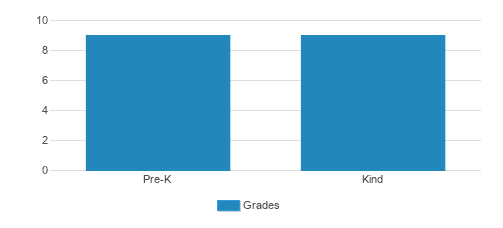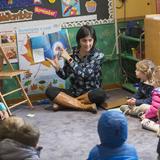Apple Tree Learning Center, where your child can take part in our program designed to enrich his/her experiences while learning the art of cooperative living.
Like most of the schools in the area, children in our school are surrounded by early learning materials, play materials, building blocks and toys.
Early learning materials are used to broaden children's basic eye-hand coordination skills as well as help further develop their senses of recognition and discrimination of shapes, sizes and color.
The philosophy of Apple Tree Learning Center is to promote a positive approach to managing the behavior of all children.
Discipline at the program has two primary goals. First, we strive to find a solution to the current situation.
Second, we attempt to help the child process feelings, recognize consequences, explore alternative solutions and outcomes, and develop internal self-control.
School Overview
School Type
Religious Affiliation
Grades Offered
Grades Kindergarten
Student Body
Total Students
18 students
Student Body Type
Co-ed
% Students of Color
83%
State avg.: 34%
Students by Grade

Academics and Faculty
Total Classroom Teachers
2 teachers
Student : Teacher Ratio
9:1
National avg.: 13:1
Tuition and Acceptance Rate
Admission Deadline
None / Rolling
School Notes
- Apple Tree Learning Center, where your child can take part in our program designed to enrich his/her experiences while learning the art of cooperative living. Like most of the schools in the area, children in our school are surrounded by early learning materials, play materials, building blocks and toys. Early learning materials are used to broaden children's basic eye-hand coordination skills as well as help further develop their senses of recognition and discrimination of shapes, sizes and color. The philosophy of Apple Tree Learning Center is to promote a positive approach to managing the behavior of all children. Discipline at the program has two primary goals. First, we strive to find a solution to the current situation. Second, we attempt to help the child process feelings, recognize consequences, explore alternative solutions and outcomes, and develop internal self-control.
Source: National Center for Education Statistics (NCES)
Frequently Asked Questions
When is the application deadline for Apple Tree Learning Center?
The application deadline for Apple Tree Learning Center is rolling (applications are reviewed as they are received year-round).
In what neighborhood is Apple Tree Learning Center located?
Apple Tree Learning Center is located in the Lake View neighborhood of Chicago, IL. There are 4 other private schools located in Lake View.
Recent Articles

A Parent's Guide To Understanding High School Teaching Methods
This comprehensive guide helps parents navigate the various teaching methods used in today's high school classrooms. By understanding these approaches, you'll be better equipped to support your teen's learning journey, communicate effectively with teachers, and create a complementary learning environment at home.

February 08, 2025
Social Emotional Learning: Education's Hidden SymphonyA musician's perspective on Social Emotional Learning reveals how this educational framework orchestrates success through five essential emotional competencies.

January 24, 2025
A Roadmap For Starting A Private SchoolUse this roadmap as a set of talking points with your trusted mentors and professionals to start the private school of your dreams. You're not alone. Over the years, hundreds of folks like you have had the same dream. From Quintilian to Maria Montessori to Lucy Madeira Wing, visionary educators have established schools to teach according to their beliefs and methodologies.
















